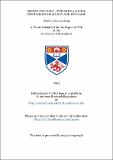Files in this item
Money and 'self' : towards a social psychology of money and its usage
Item metadata
| dc.contributor.advisor | Reicher, Stephen | |
| dc.contributor.author | Sonnenberg, Stefanie | |
| dc.coverage.spatial | vii, 286 p. | en_US |
| dc.date.accessioned | 2018-06-18T12:16:41Z | |
| dc.date.available | 2018-06-18T12:16:41Z | |
| dc.date.issued | 2003 | |
| dc.identifier.uri | https://hdl.handle.net/10023/14192 | |
| dc.description.abstract | This thesis contends that the subjective meanings and value attached to money may, in part, be a function of identity-related norms and values. This proposed relationship between identity issues and monetary attitudes/behaviour is explored across a series of methodologically diverse studies. It is argued that psychological approaches to money, despite their efforts to the contrary, frequently concur with traditional economic models of human behaviour in so far as they rest on similarly static, de-contextualised notions of the self. The research described here aims to substitute these implicit assumptions about the nature of selfhood with a social psychological account of the 'self and thus with an explicit focus on subjective identification processes, ha doing so, the present approach draws on the Social Identity tradition. First, findings from an exploratory interview study illustrate a) that identity concerns are central for people's understandings of money, b) that the relationship between money and selfhood is dilemmatic, and c) that money meanings and usage relate to identity across different levels of abstractions (i.e. personal, social, human). Second, a series of experimental studies (based on predictions derived from the Social Identity model of the self) shows that attitudes towards money can vary as a function of both social identity salience and the comparative context in which a given identity is salient. The association between social identification, specific identity contents and monetary attitudes is also addressed. Finally, an exploration of the relationship between identity concerns and decision-making processes within a Prisoner's Dilemma-type setting indicates that identity and the social knowledge derived from it play a crucial role, not only with regard to how people attempt to meet their goals in this context but also in terms of how these goals are defined. The broader implication of these findings with regard to 'rational choice' models of human agency are discussed. | en_US |
| dc.language.iso | en | en_US |
| dc.publisher | University of St Andrews | |
| dc.subject.lcc | HG222.3S7 | |
| dc.subject.lcsh | Money--Psychological aspects | en |
| dc.subject.lcsh | Identity (Psychology) | en |
| dc.subject.lcsh | Group identity | en |
| dc.title | Money and 'self' : towards a social psychology of money and its usage | en_US |
| dc.type | Thesis | en_US |
| dc.type.qualificationlevel | Doctoral | en_US |
| dc.type.qualificationname | PhD Doctor of Philosophy | en_US |
| dc.publisher.institution | The University of St Andrews | en_US |
This item appears in the following Collection(s)
Items in the St Andrews Research Repository are protected by copyright, with all rights reserved, unless otherwise indicated.

